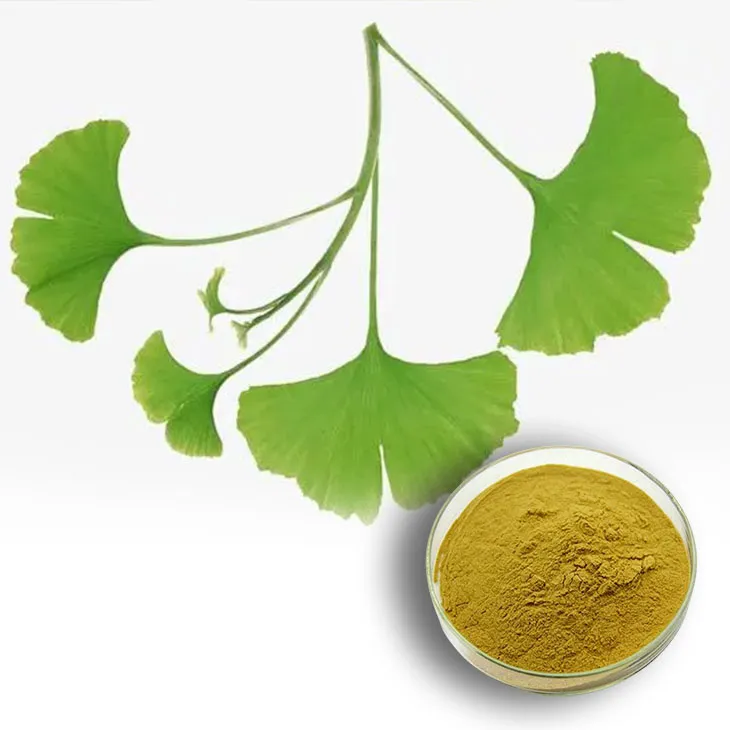- 0086-571-85302990
- sales@greenskybio.com
Shaping the Future: Trends and Innovations in the Ginkgo Biloba Extract Industry.
2024-12-22

1. Introduction
The Ginkgo biloba extract industry has been steadily growing over the years, and it is currently at a point where multiple factors are influencing its future trajectory. This natural health product has a long history of use in traditional medicine, particularly in Asian cultures. In recent decades, it has gained popularity in Western countries as well, mainly due to its potential health benefits. As the global interest in natural remedies continues to rise, the Ginkgo biloba extract industry is poised for significant transformation.

2. Technological Advancements in Extraction
2.1. Supercritical Fluid Extraction
One of the most innovative extraction methods emerging in the Ginkgo biloba extract industry is supercritical fluid extraction. This technique uses supercritical fluids, typically carbon dioxide, which possess properties between those of a gas and a liquid. The advantage of this method is that it can extract the active compounds from Ginkgo biloba leaves more selectively and efficiently compared to traditional solvent - based extraction methods. It also leaves behind fewer impurities, resulting in a purer extract. Moreover, it is considered a more environmentally friendly option as it reduces the use of harmful organic solvents.
2.2. Microwave - Assisted Extraction
Microwave - assisted extraction is another technological advancement. By using microwaves to heat the plant material, this method can significantly reduce the extraction time. This is because microwaves can penetrate the plant cells more effectively, facilitating the release of the active ingredients from Ginkgo biloba leaves. In addition, it can also help in preserving the integrity of the bioactive compounds, which is crucial for maintaining the quality and efficacy of the extract.
3. Growing Health Awareness and the Demand for Ginkgo Biloba Extract
3.1. Cognitive Health Benefits
With the increasing awareness of the importance of cognitive health, especially among the aging population, the demand for Ginkgo biloba extract has been on the rise. Studies have suggested that Ginkgo biloba may have potential benefits for improving memory, concentration, and overall cognitive function. This has led to its inclusion in various dietary supplements targeted at those looking to enhance their mental acuity or prevent age - related cognitive decline.
3.2. Cardiovascular Health
Another area where Ginkgo biloba extract is gaining attention is in relation to cardiovascular health. It is believed that the extract may help in improving blood circulation, reducing blood viscosity, and preventing platelet aggregation. As people become more conscious of heart health and the risk factors associated with cardiovascular diseases, the use of Ginkgo biloba extract as a preventive measure has become more appealing.
4. Emerging Markets for Ginkgo Biloba Extract
4.1. Asia - Pacific Region
The Asia - Pacific region, which has a long - standing tradition of using Ginkgo biloba in traditional medicine, continues to be a significant market for its extract. In countries like China and South Korea, there is a growing demand for high - quality Ginkgo biloba extract products, both for domestic use and for export. The increasing disposable income in these countries, along with the rising popularity of traditional Chinese medicine globally, is fueling the growth of the Ginkgo biloba extract market in the Asia - Pacific region.
4.2. Europe
Europe has also emerged as a major market for Ginkgo biloba extract. The region has a large population of health - conscious consumers who are increasingly interested in natural health products. The regulatory environment in Europe, which is relatively strict in terms of quality and safety standards, has also contributed to the growth of the industry by ensuring that only high - quality Ginkgo biloba extract products are available in the market.
5. Diverse Applications of Ginkgo Biloba Extract
5.1. Dietary Supplements
The most common application of Ginkgo biloba extract is in dietary supplements. These supplements are available in various forms, such as capsules, tablets, and liquid extracts. They are often marketed as products that can enhance cognitive function, improve memory, and support overall health. The formulation of these supplements may also include other ingredients, such as vitamins and minerals, to provide additional health benefits.
5.2. Cosmetics
In the field of cosmetics, Ginkgo biloba extract is being used for its antioxidant and anti - inflammatory properties. It can be found in products such as creams, lotions, and serums, where it is claimed to help in reducing wrinkles, improving skin elasticity, and protecting the skin from environmental damage. The extract's ability to improve blood circulation also makes it potentially useful in hair care products, as it may promote hair growth and prevent hair loss.
5.3. Pharmaceuticals
There is ongoing research into the potential use of Ginkgo biloba extract in pharmaceuticals. Some studies have explored its use in the treatment of neurodegenerative diseases, such as Alzheimer's and Parkinson's disease, although more research is needed to establish its efficacy and safety in this regard. The extract may also be used in combination with other drugs to enhance their therapeutic effects or reduce their side effects.6. The Industry's Role in Sustainable Development
6.1. Sustainable Sourcing
As the demand for Ginkgo biloba extract grows, sustainable sourcing of Ginkgo biloba leaves becomes crucial. This involves ensuring that the trees are harvested in a way that does not damage the natural environment and that the supply chain is traceable. Some companies are now working with local farmers and communities to promote sustainable cultivation practices, such as organic farming and agroforestry.
6.2. Waste Reduction
The Ginkgo biloba extract industry also has a role to play in waste reduction. During the extraction process, there are often by - products and waste materials generated. Companies are exploring ways to recycle or reuse these waste materials, such as converting them into bio - fertilizers or using them in other industrial processes. This not only helps in reducing the environmental impact of the industry but also can lead to cost savings.7. Challenges and Opportunities in the Ginkgo Biloba Extract Industry
7.1. Quality Control
One of the major challenges in the Ginkgo biloba extract industry is ensuring consistent quality. Since the efficacy of the extract depends on the concentration and integrity of its active compounds, strict quality control measures are required at every stage of production, from raw material sourcing to final product packaging. This includes testing for contaminants, ensuring proper extraction procedures, and verifying the potency of the extract.
7.2. Regulatory Hurdles
The regulatory environment for Ginkgo biloba extract products varies from country to country. This can pose a challenge for companies looking to expand their market globally, as they need to comply with different regulatory requirements in different regions. However, these regulations also present an opportunity for the industry to standardize and improve the quality of its products.
7.3. Research and Development
While there have been some studies on the potential health benefits of Ginkgo biloba extract, more research is still needed. Continued research and development can help in uncovering new applications for the extract, as well as in better understanding its mechanisms of action and potential side effects. This can also enhance the credibility of the industry and drive further growth.8. Conclusion
The Ginkgo biloba extract industry is on an exciting journey of growth and transformation. Technological advancements in extraction, growing health awareness, emerging markets, diverse applications, and the industry's role in sustainable development are all shaping its future. However, it also faces challenges such as quality control, regulatory hurdles, and the need for further research. By addressing these challenges and capitalizing on the opportunities, the Ginkgo biloba extract industry can continue to thrive and contribute to the global health and wellness landscape.
FAQ:
What are the main trends in the Ginkgo biloba extract industry?
The main trends in the Ginkgo biloba extract industry include technological advancements in extraction methods, which lead to higher - quality and more pure extracts. There is also a growing trend towards diverse applications, such as in the fields of cognitive health, cardiovascular health, and anti - aging. Additionally, with the increasing global health awareness, the demand for natural health products like Ginkgo biloba extract is on the rise. Another trend is the industry's focus on sustainable development, ensuring the sustainable sourcing of Ginkgo biloba.
How are technological advancements influencing the Ginkgo biloba extract industry?
Technological advancements are having a significant impact on the Ginkgo biloba extract industry. New extraction methods, such as supercritical fluid extraction, are being developed. These methods allow for more efficient extraction of active compounds from Ginkgo biloba leaves, resulting in higher - quality extracts. Advanced analytical techniques also enable better quality control, ensuring the consistency and safety of the extract. Moreover, technological progress in formulation and delivery systems is expanding the possibilities for the use of Ginkgo biloba extract in various products, like tablets, capsules, and even topical applications.
What are the emerging markets for Ginkgo biloba extract?
Emerging markets for Ginkgo biloba extract include the Asia - Pacific region, especially countries like China and India, where there is a growing middle - class population with increasing disposable income and a rising interest in natural health products. In addition, some African countries are also emerging as potential markets as awareness about natural remedies spreads. In the Western world, the market is expanding beyond traditional supplement users to a wider range of consumers interested in preventive health measures and natural alternatives to pharmaceuticals.
What are the new extraction methods in the Ginkgo biloba extract industry?
Some new extraction methods in the Ginkgo biloba extract industry include supercritical fluid extraction, which uses a fluid above its critical temperature and pressure to extract active compounds. Another method is microwave - assisted extraction, which utilizes microwave energy to speed up the extraction process. These new methods offer advantages such as shorter extraction times, higher yields of active compounds, and reduced solvent usage compared to traditional extraction methods like solvent extraction.
How does the Ginkgo biloba extract industry contribute to sustainable development?
The Ginkgo biloba extract industry can contribute to sustainable development in several ways. Firstly, by promoting sustainable sourcing of Ginkgo biloba, for example, through the cultivation of Ginkgo trees in a sustainable manner, ensuring that the raw material is harvested without causing long - term damage to the environment. Secondly, the industry can focus on reducing waste and energy consumption in the extraction and production processes. Additionally, some companies in the industry may engage in community development projects in areas where Ginkgo biloba is sourced, such as providing employment opportunities and supporting local infrastructure.
Related literature
- The Ginkgo biloba Extract: From Traditional Use to Modern Research"
- "Innovations in Ginkgo biloba Extraction Technology: A Review"
- "Market Trends of Ginkgo biloba Extract in the Global Health Industry"
- ▶ Hesperidin
- ▶ Citrus Bioflavonoids
- ▶ Plant Extract
- ▶ lycopene
- ▶ Diosmin
- ▶ Grape seed extract
- ▶ Sea buckthorn Juice Powder
- ▶ Fruit Juice Powder
- ▶ Hops Extract
- ▶ Artichoke Extract
- ▶ Mushroom extract
- ▶ Astaxanthin
- ▶ Green Tea Extract
- ▶ Curcumin
- ▶ Horse Chestnut Extract
- ▶ Other Product
- ▶ Boswellia Serrata Extract
- ▶ Resveratrol
- ▶ Marigold Extract
- ▶ Grape Leaf Extract
- ▶ New Product
- ▶ Aminolevulinic acid
- ▶ Cranberry Extract
- ▶ Red Yeast Rice
- ▶ Red Wine Extract
-
Cactus Extract
2024-12-22
-
Berberis aristata Extract
2024-12-22
-
American Ginseng Root Extract
2024-12-22
-
Natural grape seed extract
2024-12-22
-
Rosemary extract
2024-12-22
-
Artichoke Extract
2024-12-22
-
Cranberry Extract
2024-12-22
-
Cassia Seed Extract
2024-12-22
-
Lemon Balm Extract
2024-12-22
-
Acerola Juice Powder
2024-12-22





















